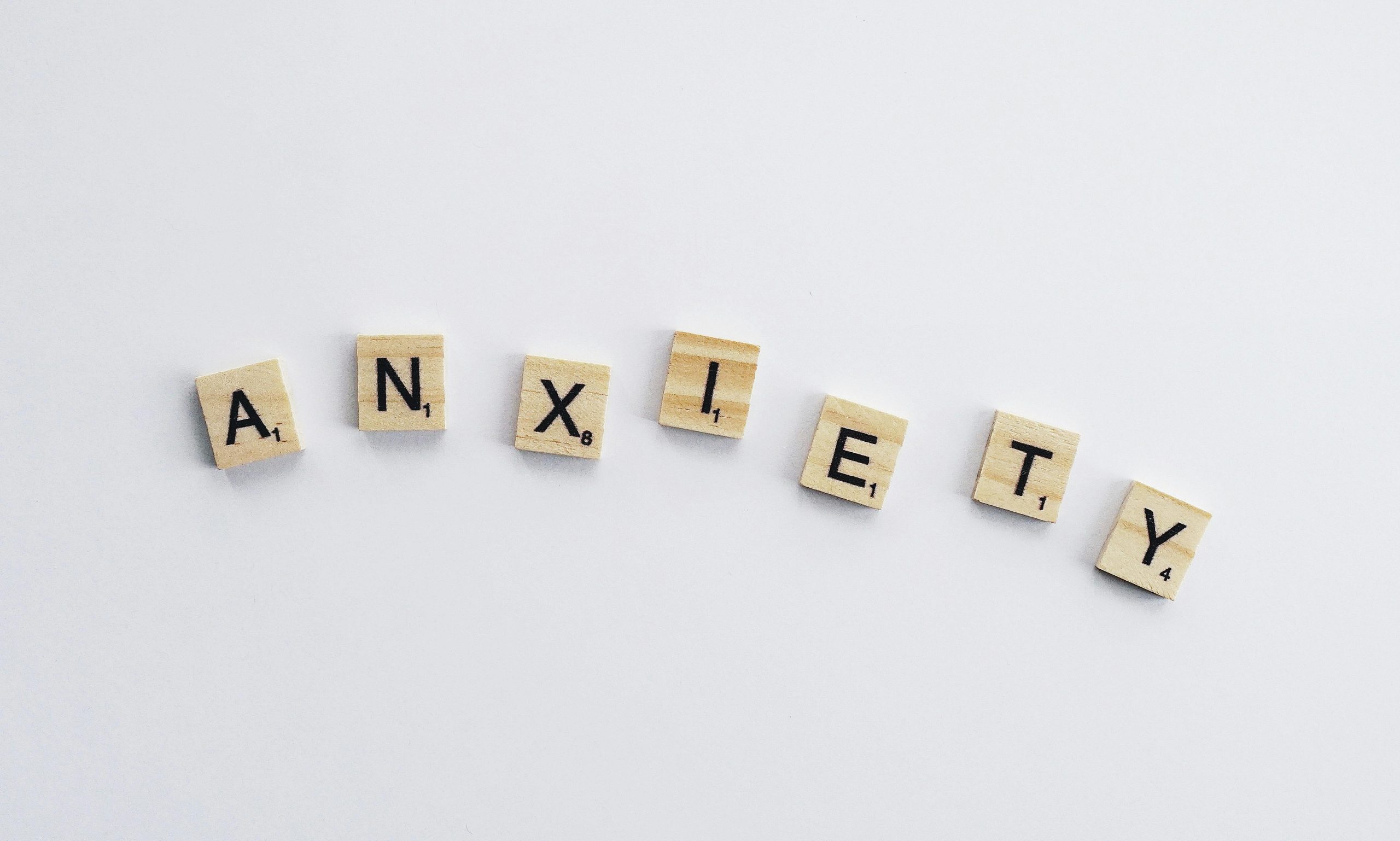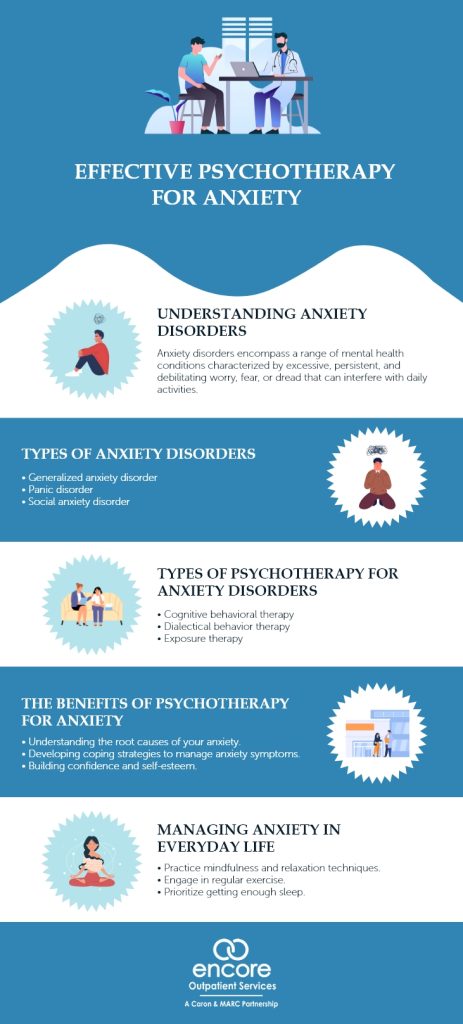Our dedication lies not just in treating symptoms but in addressing the root causes, offering a holistic approach that integrates the best of therapeutic practices with the warmth of community support.
Effective Psychotherapy for Anxiety

Anxiety is a common yet often misunderstood condition that affects a significant portion of the population and can deeply impact one’s quality of life. As individuals grapple with the complexities of daily life, the need for effective therapeutic interventions to alleviate anxiety has become increasingly paramount. This article delves into different psychotherapeutic approaches, the role of therapists, and the effectiveness of these treatments in alleviating anxiety. Our goal is to provide you with a comprehensive understanding of how psychotherapy can be an invaluable tool in the journey toward better mental health.
Understanding Anxiety Disorders
Anxiety disorders encompass a range of mental health conditions characterized by excessive, persistent, and debilitating worry, fear, or dread that can interfere with daily activities. They are among the most common mental health challenges globally, affecting millions of individuals across various age groups and backgrounds. According to the Anxiety and Depression Association of America (ADAA), over 40 million adults in the United States, which is 19.1% of the population, have an anxiety disorder.
Symptoms of anxiety disorders may include restlessness, heightened irritability, tension, a sense of impending danger, difficulty concentrating, rapid heartbeat, and sleep disturbances. The causes of these disorders are often a complex interplay of genetic, environmental, psychological, and developmental factors.
Diagnosis of an anxiety disorder is typically made by a mental health professional based on a detailed medical history, physical examination, and, if necessary, psychological evaluations. These disorders can affect various aspects of life, including work, relationships, and routine activities. They can limit an individual’s ability to function effectively in daily life.
Treatment of anxiety disorders often involves a combination of psychotherapy, medications, and lifestyle changes. Early treatment can significantly improve the quality of life for individuals with anxiety disorders. The most suitable treatment plan varies from person to person, necessitating consultation with a healthcare provider for precise diagnosis and personalized treatment plans.
Types of Anxiety Disorders
There are a variety of anxiety disorders, each characterized by specific symptoms and patterns of excessive worry or fear. Here are some of the common types:
- Generalized Anxiety Disorder (GAD) – This involves persistent and excessive worry about various aspects of life, such as health, work, relationships, or everyday situations. Individuals with GAD often find it difficult to control their worry, and this can interfere with their daily functioning.
- Panic Disorder – This is characterized by recurrent and unexpected panic attacks, which are sudden episodes of intense fear or discomfort. People with panic disorders may develop an apprehension about experiencing another panic attack, leading to avoidance of certain situations.
- Social Anxiety Disorder (SAD) – This involves an intense fear or discomfort of social situations, often driven by a fear of being judged, embarrassed, or criticized. It can lead to avoidance of social interactions.
- Specific Phobias – This entails overwhelming and irrational fears of specific objects, situations, or activities. Typical phobias include fear of heights, certain animals, flying, public speaking, or enclosed spaces.
- Obsessive-Compulsive Disorder (OCD) – This involves recurrent, intrusive thoughts that cause anxiety and repetitive behaviors or mental acts performed to reduce anxiety. Individuals with OCD may feel compelled to repeat rituals or behaviors, even if they acknowledge their excessiveness.
- Post-Traumatic Stress Disorder (PTSD) – This develops after exposure to a traumatic event, such as a life-threatening situation, violence, or abuse. Symptoms include intrusive memories, nightmares, flashbacks, hypervigilance, and emotional numbness.
- Separation Anxiety Disorder – Though more common in children, adults can also suffer from separation anxiety disorder, which is an excessive fear of being separated from home or loved ones.
Each anxiety disorder has unique features, but they commonly overlap in symptoms like excessive fear and avoidance behaviors. Accurate diagnosis and treatment are essential for managing these conditions effectively.

Types of Psychotherapy for Anxiety Disorders
Various types of psychotherapy have been proven effective in treating individuals with anxiety disorders, each with its unique approach:
- Cognitive Behavioral Therapy (CBT) – CBT is one of the most widely used therapies for anxiety. It focuses on identifying and changing negative thought patterns and behaviors that contribute to anxiety.
- Exposure Therapy – This form of behavioral therapy involves gradual exposure to anxiety-provoking situations to help individuals face and gain control over their fears. Exposure therapy is particularly effective for specific phobias, OCD, and PTSD.
- Mindfulness-Based Therapies – These approaches, including Mindfulness-Based Stress Reduction (MBSR) and Mindfulness-Based Cognitive Therapy (MBCT), teach individuals to focus on the present moment, helping reduce anxiety by avoiding overemphasizing past or future worries.
- Acceptance and Commitment Therapy (ACT) – ACT combines mindfulness strategies with commitment and behavior change strategies to increase psychological flexibility and reduce anxious feelings.
- Dialectical Behavior Therapy (DBT) – Initially developed for borderline personality disorder, DBT has been adapted for anxiety treatment. It emphasizes balancing acceptance and change and teaches skills for emotion regulation and stress tolerance.
- Interpersonal Therapy (IPT) – IPT focuses on improving interpersonal relationships and communication, which can help alleviate anxiety symptoms, especially when anxiety is linked to relationship challenges.
- Eye Movement Desensitization and Reprocessing (EMDR) – Originally designed for PTSD, EMDR involves guided eye movements during exposure to traumatic memories to help process and reduce associated anxiety.
- Psychodynamic Therapy – This therapy explores the underlying psychological roots of anxiety, often looking into early life experiences and emotional conflicts. Psychodynamic therapy has proven to be efficacious in the treatment of anxiety disorders, including generalized anxiety disorder, panic disorder, and social anxiety disorder.
- Problem-Solving Therapy (PST) – PST is a type of psychotherapy that can provide training in adaptive problem-solving skills as a means of better resolving and/or coping with stressful problems. PST can help individuals with anxiety disorders to make effective decisions, generate creative means of dealing with problems, and accurately identify barriers to reaching their goals.
- Family Therapy – For cases where family dynamics play a role in an individual’s anxiety, family therapy can be beneficial. It helps family members understand the disorder and learn ways to support their loved ones.
Each type of psychotherapy offers different approaches to treating anxiety, and the choice of therapy may depend on individual preferences, specific symptoms, and the severity of the condition. A mental health professional can help determine the most suitable approach for each individual.
The Benefits of Psychotherapy for Anxiety
Psychotherapy for anxiety disorders offers several significant benefits:
- Understanding the Root Causes – Psychotherapy helps uncover the underlying causes of anxiety, whether they stem from past traumatic experiences, thought patterns, or behavioral habits.
- Developing Coping Strategies – It equips individuals with effective coping mechanisms and tools to manage anxiety symptoms, enhancing their ability to deal with stressors.
- Improving Emotional Regulation – Through psychotherapy, individuals learn how to regulate their emotions better, reducing the intensity and frequency of anxiety attacks.
- Enhancing Self-Awareness – Psychotherapy increases self-awareness, enabling individuals to recognize the onset of anxious thoughts and feelings and intervene early.
- Building Confidence and Self-Esteem – As individuals gain control over their anxiety, they often experience an increase in self-esteem and confidence in handling life’s challenges.
- Improving Relationships – Psychotherapy can improve interpersonal skills and communication, leading to healthier relationships, which can be particularly beneficial for those whose anxiety is linked to social interactions.
- Long-Term Relief – Unlike medication, which often treats only the physical symptoms, psychotherapy aims to provide long-term relief by addressing the root causes of anxiety.
- Personal Empowerment – Psychotherapy fosters a sense of empowerment as individuals actively participate in their own healing process.
By addressing both the symptoms and the underlying issues, psychotherapy for anxiety disorders can lead to lasting changes, a sense of control, and improvements in an individual’s overall quality of life.
Choosing the Right Therapist
Selecting the right therapist is crucial for effective treatment of anxiety. Here are key factors to consider:
- Credentials and Experience – Ensure the therapist is licensed and has experience in treating anxiety disorders. Specialization in specific types of anxiety like social anxiety, panic disorders, or generalized anxiety is a plus.
- Therapeutic Approach – Different therapists use different approaches. Research and understand which type of psychotherapy might work best for your specific needs and preferences.
- Comfort and Compatibility – A good therapeutic relationship is based on trust and comfort. Consider if you feel at ease discussing your challenges with the therapist.
- Location and Accessibility – Convenience of location and session times can be important, especially if ongoing treatment is needed.
- Consultation – Many therapists offer an initial consultation, which can be a good opportunity to assess if their style and approach are a good fit for you.
Remember, finding the right therapist may take time, but it’s an important investment in your mental health and well-being.
Managing Anxiety in Everyday Life
Effective daily management of anxiety is key to sustaining mental well-being. The following are some practical strategies to help in this process:
- Mindfulness and Relaxation Techniques – Practice mindfulness, deep breathing, or meditation to help calm the mind and reduce anxiety symptoms.
- Regular Physical Activity – Engage in regular exercise, which has been proven to lower stress levels and improve mood.
- Healthy Sleep Habits – Prioritize getting enough sleep, as a lack of rest can exacerbate anxiety.
- Balanced Diet – Maintain a balanced diet, as certain foods can impact mood and stress levels.
- Time Management – Organize your schedule to reduce stress, allowing time for rest and relaxation.
- Social Support – Stay connected with friends and family, as social support is vital for managing stress and anxiety.
- Limiting Stimulants – Reduce intake of caffeine and alcohol, which can trigger or worsen anxiety symptoms.
- Mindful Journaling – Keep a journal to express thoughts and feelings, helping to clarify and manage emotions.
- Setting Realistic Goals – Set achievable goals and celebrate small victories to build confidence and reduce feelings of anxiety.
- Seeking Professional Help – If anxiety becomes overwhelming, consider seeking help from a mental health professional.
Incorporating these strategies into your daily routine can help manage anxiety levels and improve overall mental health.
If you or someone you know is facing challenges with anxiety disorder, Encore Outpatient Services offers a supportive pathway to recovery. We recognize the profound effect anxiety can have on daily life and provide tailored treatments specifically designed to meet unique mental health needs. Our approach aims not only to reduce physical symptoms but also to equip individuals with the tools and resilience needed for daily life. At Encore, we focus on delivering practical solutions to real-life challenges, ensuring that each person’s well-being and quality of life are our primary concerns. Explore the supportive and effective care offered at Encore Outpatient Services, where your journey to better mental health is our primary objective.
Let Us Support You On Your Recovery Journey!
Copyright 2026 Encore Outpatient Services | All Rights Reserved



